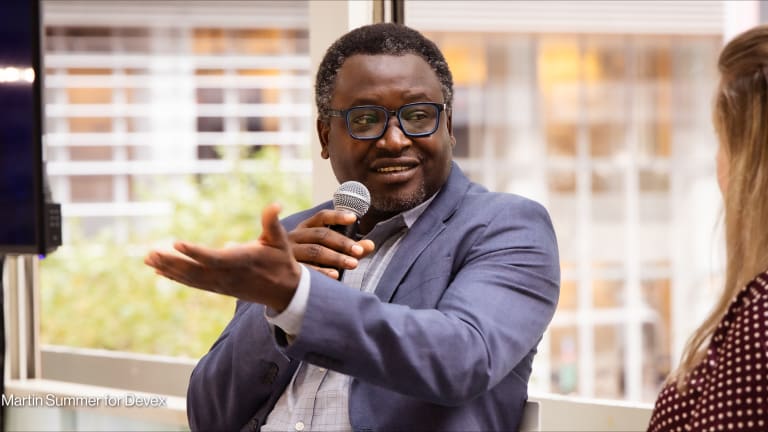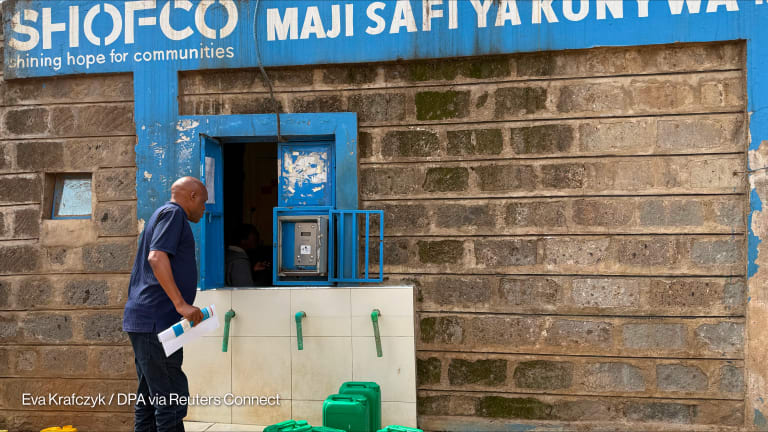Opinion: COP 27 left out Africans, but climate progress still possible

Touted as “Africa’s COP” the 27th United Nations Climate Change Conference, or COP 27, held Nov. 6-18 in Sharm el-Sheikh, Egypt, had many hopeful we would see some real climate solutions for African communities and the world. It’s only the fifth time in the conference's nearly 30-year history it has been held on the African continent, and this year, against a backdrop of increasing floods, famine, and estimates that over 100 million Africans will be displaced or have to relocate due to the climate crisis, the outcomes felt incredibly urgent and important.
Yet, once again, COP has shown us it has become more performative theater for world leaders than a vehicle to drive concrete change. While U.S. President Joe Biden pledged to meet the moment “with urgency and with determination to ensure a cleaner, safer, and healthier planet for all of us,” we saw young African activists shut out of conversations and Indigenous leaders fight against the “humiliating” treatment of their knowledge and expertise.
And when leaders from some of the world’s biggest polluters and CEOs of oil companies are on panels to discuss “climate adaptation” for the “most vulnerable communities,” it’s clear the power dynamics of the summit are off.
Trust requires recognizing the strength of local organizations and understanding that outsiders cannot always know what’s best for communities
—Yes, I am heartened that high-income countries have finally agreed to a “loss and damage fund” for “developing” countries impacted by the climate crisis they’ve had no hand in creating, and applaud the decadeslong unwavering advocacy from local leaders who are rightly celebrating this as a win. Yet there are still a lot of unknowns about how the fund will work and no guarantee we’ll actually see money flowing to local organizations.
I come from what they would call a “vulnerable community,” and I can tell you that we are already adapting to the climate crisis — because we are living it every day. In Kibera, the largest urban slum in Kenya where I grew up and founded my organization, Shining Hope for Communities, or SHOFCO, we’ve seen an increase in annual flooding destroying lives and families. Despite regulations in place to protect high risk areas, there is a lack of adequate infrastructure to properly respond. Yet we continue to adapt and work out ways to keep our communities safe.
The problem with COP is the problem with any major moment where world leaders come together to “solve” a crisis that is impacting millions of people without their power or resources — the solutions are coming from the top.
Through SHOFCO’s work with the Global Alliance for Communities, which represents community-based organizations around the world, we know sustained change is not possible without leaders designing the solutions to combat the impacts of the climate crisis in their own communities. Yet these leaders and organizations are systemically left out of the conversation on sustainable climate solutions. It’s time we upend the traditional approaches which are frankly grounded in colonialist histories. We see the path forward for climate localization as follows:
1. We want more than a seat at the table, we want local and Indigenous leaders creating the table and co-designing solutions. While low- and middle-income countries are often the most affected by climate change, they are also home to a multitude of local, community-based organizations that are driving innovative and cost-effective solutions in their communities. Local organizations are nimble and can move quickly, which is crucial. When every year we fail to meet these slowly compromised targets, we jeopardize millions of more lives.
2. We need to shift funding and power. There was enough money and power and influence at COP 27 to change the trajectory of the climate crisis. But without real investment in community-driven solutions over flashy quick fixes, we will continue to ignore the needs of local communities to our detriment. At COP 27, we saw world leaders and philanthropists repeatedly asking the same types of questions: What is the next big invention we can create to roll back carbon dioxide emissions, and who — what country or philanthropist — will be credited with inventing it?
These are the wrong questions if we want to drive real progress. We should instead look to local organizations like Kisumu Environmental Champs, a youth-led initiative of teenagers who are educating their community on the climate crisis and its impacts. Despite small budgets and little international investment, the group is seeing real results in their community. For true change, decision-making power should lie with those who are closest to the work.
3. We also need trust. If world leaders are as committed to progress as they said in their speeches and press conferences, they must face their internal biases and place trust in local community leaders. Trust requires recognizing the strength of local organizations and understanding that outsiders cannot always know what’s best for communities.
4. And of course we need real commitments with accountability. We want to see at least 30% of international aid budgets earmarked for climate adaptation going directly to community-based organizations with the same trust and parameters offered to — often white-led — international NGOs. And we want clearer mechanisms for tracking progress to drive accountability around localization efforts. Funders need to co-design metrics for success and accountability with local organizations so we can fight this climate emergency together.
Having spent over a decade as a leader in the fight for the localization of aid, COP 27's failures are disappointing but not surprising. Yet I remain hopeful. The movement for the localization of aid is growing rapidly and if we prioritize honesty, trust, and a willingness to match rhetoric with action, climate localization will become an unstoppable force for change and the future of our planet. We’re committed to working with international donors and local organizations to do this, will you join us?
Search for articles
Most Read
- 1
- 2
- 3
- 4
- 5








